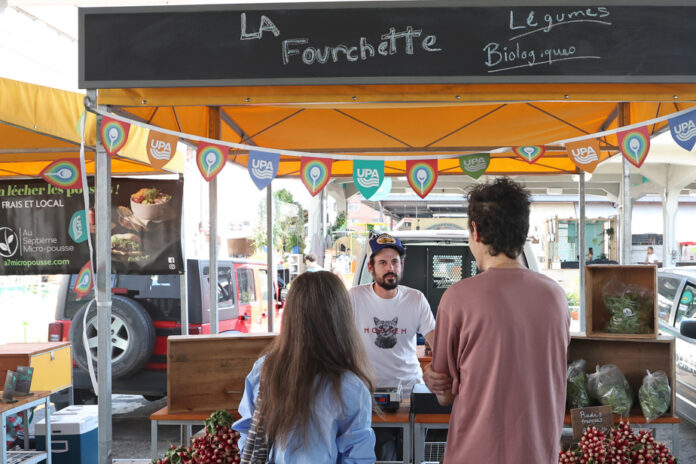The challenge for some young agricultural entrepreneurs is not to grow vegetables, but to sell them.
“In Quebec, we don’t have a production issue. We are working a lot on this, the policies are very oriented around production, but we have a marketing issue, ”says Rémi Fournier, who has a small market gardening business in Frelighsburg.
The challenge is therefore to reach a certain clientele that is difficult to access when starting a business. Rémi Fournier took part last year in the New Generation Kiosks program, which allowed him to have a presence at the Atwater market, at a reduced rate.
“Small farms have few means and very limited resources. A program like this makes all the difference,” says the market gardener, who works specifically to develop innovative forms of marketing.
His ecological farm Au cœur du Pinacle will therefore be back in town this year. She will not be alone: twenty young agricultural companies, which have been in business for a maximum of five years, will be at one of the five Booths for the next generation.
The program has taken root in the city’s three largest markets: Maisonneuve, Atwater and Jean-Talon. The Union of Agricultural Producers (UPA) pays half of the site rental costs.
The regular price for renting a booth in these markets is $56.50, regardless of the day.
“Without this type of initiative, it’s impossible to have a storefront in hot places like Montreal’s public markets,” says Rémi Fournier. It’s way too expensive. »
“It’s so expensive, continues the entrepreneur, that producers are forced to complete their offer with a package of products. “Products that they do not grow in their fields, of course.
The proposed formula has the great advantage of allowing farmers to book a stand one day a week.
For Léandre Raymond-Desjardins, this makes all the difference.
Its Jardins de la Fourchette were founded three years ago, in Saint-Janvier, in the Laurentians. One day a week, the producer is at the Jean-Talon market. He sells his vegetables there: 70 varieties during the entire season.
The producer has adopted a marketing strategy with three points of sale: consumers directly, through the Fermiers de famille network, restaurants and markets – a public market in his region and the kiosk at the Jean-Talon market, where we met him on Friday morning.
“It allows us to meet people, to build a clientele,” he says, admitting that the Montreal market is very popular with chefs, which has allowed him to do some unplanned networking.
Rémi Fournier sees another benefit in this direct access to urban customers.
“Not only does it give a completely different experience to the customer, but it’s educational,” he explains. Each passing customer allows us to have a conversation and exchange, to change perceptions of food, the availability of products, where they come from and how they are made. It is truly exceptional. »
There will be as many this year. The farms that signed up grow a variety of vegetables, but some specialize in mushrooms, sprouts, garlic, or cabbage. Entrepreneurs arrive directly with their truck, without needing to provide equipment to install or maintain a kiosk.
“We removed all possible obstacles for them so that they could come here,” says Nicolas Fabien-Ouellet, general manager of Montreal’s Public Markets.
According to him, the regulars of the markets, those who have their circuit well established when they shop, notice and appreciate the newcomers. In addition to the New Generation Kiosks, the Jean-Talon market offers eight locations this year for companies that do not wish to commit to the standard formula which requires a minimum presence of three days a week. This is another way, explains Nicolas Fabien-Ouellet, to pave the way for the next generation.















